
Aug 30, 2024
The future of children—their education, development and eventual livelihoods—is an essential reason for ending the war in Sudan, according to the Teachers’ Campaign to End the War.
The Sudanese Teachers Committee, which organized the peace initiative, is part of the Sudanese Civil and Labor Coalition that includes labor and civil society organizations, and is a member of al Taqadum-Sudanese Civil Front movement.
Under the banner, “Teachers are builders of civilizations and advocates of peace,” the Sudanese Teachers Committee points out that no family is “untouched by the destruction caused by the war,” and notes that teachers are the most capable in leading the movement by rejecting the war, with education as the key to achieving peace.
The war in Sudan, which began April 15, 2023, has resulted in the killing, displacement and starvation of millions of people, as well as the destruction of vital public institutions. Nearly 26 million people, half of Sudan’s population, are facing acute hunger. More than 12 million people have been displaced by fighting between a military government and a paramilitary group.
Some 19 million children are out of school, while teachers have not received wages since the start of the war. The committee is serving the public by providing school—at least 6,000 facilities—in shelters.
Reaching Out for Children’s Education
 On a Facebook page, which now includes 118,000 followers, the Solidarity Center-backed committee has added dozens of first-person videos by those calling for an end to war, and is campaigning for students’ ability to learn to read and return to school.
On a Facebook page, which now includes 118,000 followers, the Solidarity Center-backed committee has added dozens of first-person videos by those calling for an end to war, and is campaigning for students’ ability to learn to read and return to school.
Committee leaders note that receiving an education is a basic right as stipulated in the International Covenant on Economic, Social and Cultural Rights, a United Nations treaty signed by Sudan.
The committee also has created a series of posters illustrating the destructive actions of war and how children thrive with education and peace.
“Peace is a means to achieve comprehensive economic and social development, and through it societies advance,” the committee says. “There is no renaissance and development in a country suffering from wars, division and conflicts.”
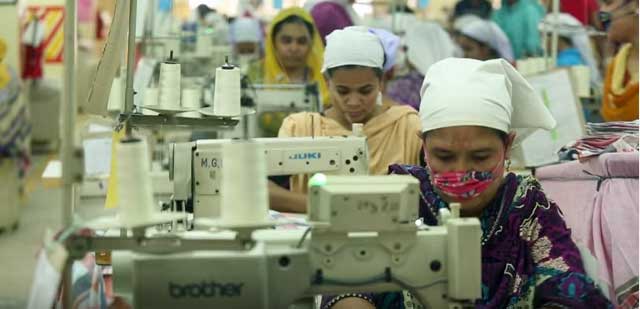
Aug 20, 2024
With the unexpected shift in Bangladesh political leadership, garment workers say they are hopeful but cautious about the effect on their wages, working conditions and fundamental civil rights, such as the freedom to form unions.
“We hope something positive will happen. However, after the fall of the government, some factories … were prevented from opening in some places,” one factory-level union representative* told the Solidarity Center. “It should not happen.”
After weeks of peaceful student protest were met with deadly government suppression, long-term Prime Minister Sheikh Hasina was forced to flee the country on August 4. Students were rallying against a government jobs quota system granting coveted decent work opportunities to family veterans of the 1971 Bangladesh war for independence. More than 600 protestors have been killed.
The economy of Bangladesh, the world’s second-largest garment exporter, depends on garment factories, but producers say customers are concerned about violence and disruption. In 2023, 4 million garment workers contributed 85 percent of Bangladesh’s $55 billion in annual exports.
The recent disruptions, including a government internet shutdown, closed factories, but some garment workers were back to work August 7.
“We only wish our garment sector to thrive,” another worker said. “Our hope is all the factories remain open.”
Lack of Union Freedom Represses Decent Wages, Work
Government repression against workers seeking to form and join unions has prevented garment workers from achieving the living wages and safe working conditions they have sought to achieve, workers say.
With a new government, garment workers seek a crucial change: The ability to freely exert their internationally recognized freedom to form independent unions and bargain collectively for wages and working conditions.
“We want to be able to exercise our trade union rights to the fullest with no pressure from anybody,” says one union leader, who has received threats for efforts to stand up for worker rights.
Although most factories have resumed production, garment workers say their monthly wage still must be increased.
“Many families live on the income of garment workers,” said the union representative.
While many garment workers received wages in July, union leaders tell Solidarity Center that in many other factories, especially those without unions, workers were not paid. In Gazipur, ready-made garments and textile factories demanded their due payment.
Last fall, garment workers who held protests for higher wages were also brutally repressed. The government raised wages to $113 a month, an amount union leaders say does not cover the cost of living, and about half of what workers sought. Multiple labor organizations, including the Industrial Bangladesh Council and Garments Sramik Parishad, said garment workers’ monthly minimum wage must be at least Tk 23,000 a month ($195.81).
Workers said last year’s wage revision did not cover basic needs as “the prices of daily commodities have skyrocketed.” One garment worker who has been on the job for 15 years said, “Usually, our wage is revised every five years. We expect the new government to do that in three years. It will be really beneficial for garment workers.”
* All workers interviewed for this story asked to remain anonymous.

Aug 10, 2023
At the end of a day picking tea leaves under the July sun, women walk from the hilly fields down an embankment and into a muddy stream, fully clothed, to bathe before they return to their company-provided tin homes where they prepare dinner for their families.
The tea estate workers in Sreemangal, Bangladesh, say their work is much harsher now due to increased heat and more torrential rains. The changing climate also means that picking the daily quota of tea leaves, always difficult, is sometimes impossible. And when they cannot meet their quota, they are paid even less than their already meager wages.
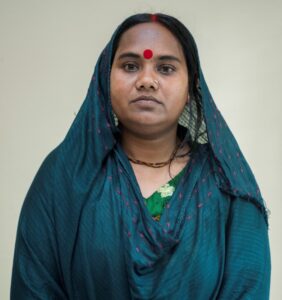
Sreemati Bauri, a Bangladesh tea worker and union leader. Credit: Solidarity Center / Hasan Zobayer
“It often happens that in a heat wave, it’s a hardship to meet the daily quota [up to 25 kilos, 55 pounds] of tea leaves, and so they can’t make the daily wage of 170 taka ($1.55),” says Sreemati Bauri, a tea estate field supervisor and union leader.
“It’s already difficult to live with this little amount of money. If a worker can’t make their daily target, it’s difficult to survive. Due to the heat, it has become too hot for them to get their wage,” she said, speaking through an interpreter. Bauri, an executive member of the Jurivally Executive Committee, part of the Bangladesh Cha Sramik Union, supervises 300 women who walk long distances across tea fields each morning before they start picking leaves.
“The heat is more excessive than before,” says Sumon Kumar Tant, a field supervisor and union member. “They have to work under scorching sun. It’s as if they have to carry two times the burden—one the burden of tea leaves on their back, and the other, the weight of the heat.”
Better Working Conditions at Unionized Tea Estates

Bangladesh tea workers walk long distances across fields on their way to pick tea leaves. Credit: Solidarity Center / Gayatree Arun
“At higher temperatures and prolonged periods of exposure, heat stress can lead to exhaustion, it can lead to permanent disability, it can even lead to death,” says Sophy Fisher, discussing the findings of an International Labor Organization (ILO) report on the impact of heat stress on workers. And women are disproportionately affected by the impacts of rising heat due to the type of work they perform and physical issues such as pregnancy, according to a new study.
Climate change-related hardships add to tea workers’ already precarious working conditions. An estimated 13 million people in 48 countries work on tea plantations around the world, mostly women who are paid low wages and have few or no health and safety protections, including safeguards to prevent and address sexual harassment and other forms of violence. Tea plantation workers often are forced to rely on their employers for food, housing and education, adding to their vulnerability.
“Tea workers give a lot of sweat for their work,” says Bauri.
Workers in the Bangladesh Cha Sramik Union, a Solidarity Center partner, have achieved workplace improvements not offered at nonunion plantations, with employers required to provide daily hour-long lunch breaks and a medical facility. Tant cites the rapid benefit payment by a company to the family of a tea picker killed on the job by a falling tree branch as an example of how the union’s intervention ensured proper compensation.
Still, more progress must be made, he said, citing the need for pregnant workers to get more time off than the four months’ paid maternity leave granted under the country’s labor law.
Little Accountability Global Tea Supply Chain

Bangladesh tea worker, Sanchari. Credit: Solidarity Center / Hasan Zobayer
Rooted in colonial era exploitation, tea plantations are rife with worker rights abuses. Accountability in the global tea supply chain is particularly lacking, with a recent report finding few corporations willing to provide the information necessary to determine how workers are treated and little due diligence across the supply chain.
A lack of supply chain transparency means companies are not being held to account for violations, says Kate Jelly, author of the Business and Human Rights Research Center (BHRRC) report, Boiling Point: Strengthening Corporate Accountability in the Tea Industry. “Many companies maintaining opaque supply chains are able to distance themselves from human rights abuses,” she told Reuters.
Based on research into news stories from 2022, the report found human rights abuses in Bangladesh and four other countries involving low or unpaid wages, lack of safety and health protections, and employer intimidation of workers seeking to improve their workplaces through unions.
Involving workers in the due diligence process is essential for supply chain transparency, according to Natalie Swan, a BHRRC labor rights program manager. “That means not relying on certification, not relying on a human rights policy or a supplier code of conduct.”
Solidarity Center believes workers must be at the center of workplace solutions, including those involving climate justice, in which the needs of workers and their communities are involved in achieving a fair or just transition to a more equitable and sustainable economy to mitigate the impacts of climate change and enable adaptation for impacted communities.
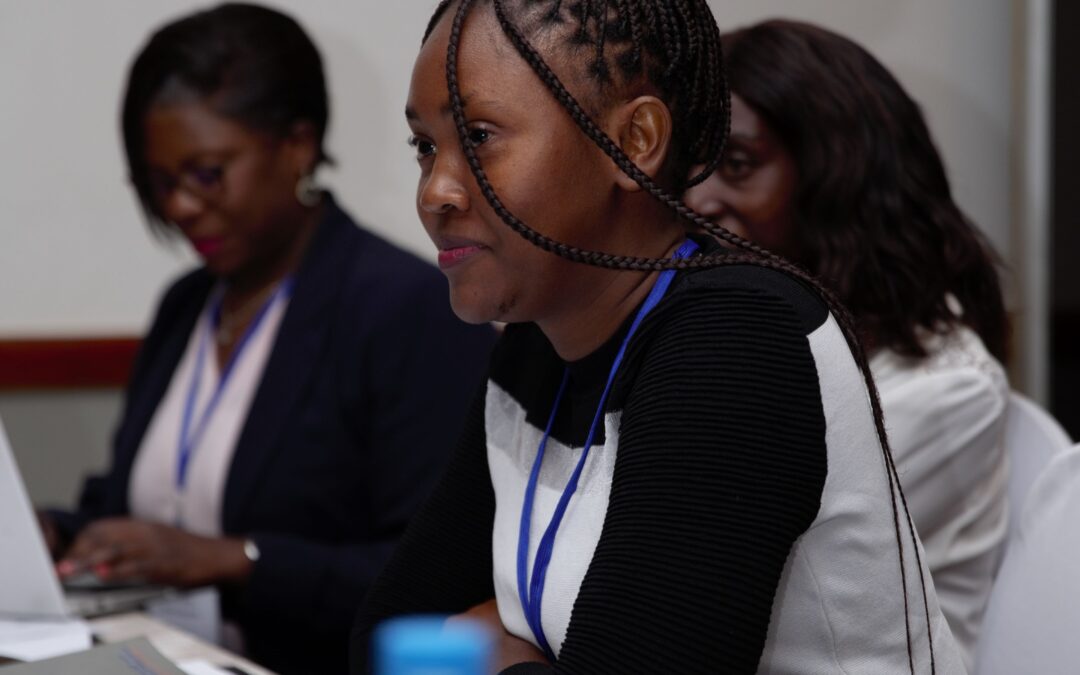
Apr 5, 2023
Dozens of union leaders from across Africa took part in the first-ever Summit for Democracy event on the continent March 30, where they discussed the essential role of unions in strengthening democracy and shared strategies on how unions can step up efforts to advance democracy through one of its most essential components—worker rights. Co-hosted by the Multilateral Partnership for Organizing, Worker Empowerment and Rights (M-POWER) and the Zambian Congress of Trade Unions (ZCTU), the day-long conference included interactive sessions focused on strengthening democracy and opening rapidly closing civic space in Africa.
“Amplifying the Voices of Workers to Safeguard Democracy in Africa” was an official side event of the second Summit for Democracy, a global democracy initiative co-hosted by Costa Rica, the Netherlands, South Korea, the United States and Zambia March 28–30, 2023. The second Summit showcased progress made by Summit partners on their commitments in the first year of the global initiative—M-POWER is one of the largest commitments made by Summit partners.
Said Joy Beene, secretary general of the Zambia Confederation of Trade Unions: “There’s no democracy without workers.”
See conference highlights in this photo essay.
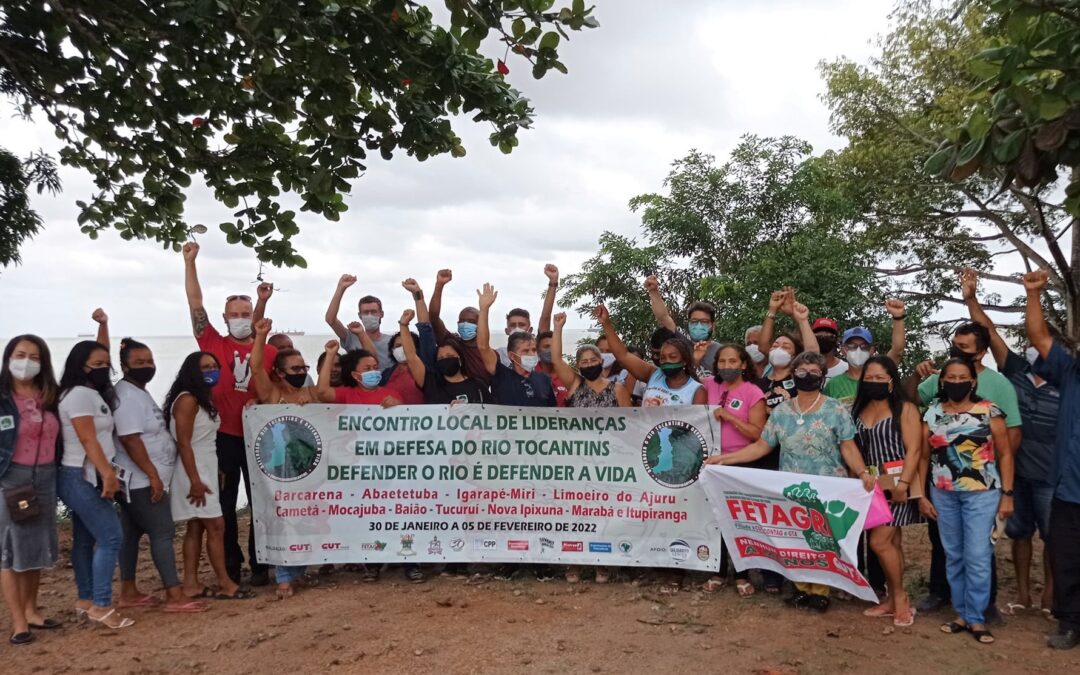
Mar 23, 2023
Brazilian communities along a river near the Amazon are celebrating the government’s decision to halt a blasting and dredging project that could destroy their livelihoods and severely damage the environment. Earlier this month, the Public Prosecutor’s Office recommended that the Brazilian Institute of the Environment and Renewable Natural Resources (IBAMA) suspend its preliminary license for the Araguaia-Tocantins waterway project in the state of Pará.
In suspending the license, the government cited the absence of prior consultation with residents who would be impacted, especially Indigenous communities and quilombolas, and the lack of information on the effects of the project on the communities.
The victory “has impacts not just for the local community, but also for the state and even further,” says Carmen Foro, speaking through an interpreter. Foro, a rural activist from the area, is former secretary-general of the Unity Worker Center in Brazil (CUT). “I feel that I and other community members are being heard, that we have opened a dialogue that this project can’t happen without our participation.” (Foro described her community’s fight for survival in a Solidarity Center Podcast episode last year.)
The project would have involved heavy dredging of the Tocantins River and require removing miles of the rocky Pedral do Lourenço river bed to increase navigability during the dry season and facilitate commodity export. IBAMA approved the preliminary license to begin the project in October 2022, ignoring several government agency recommendations.
Key to Success: Mobilizing a Diverse Coalition
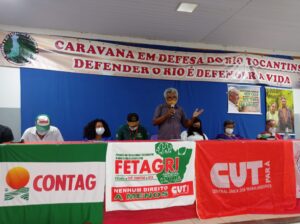
Members of the Caravan in Defense of the River Tocantins meet with residents of Nova Ipixuna to discuss a proposed waterway project that threatened livelihoods and the environment. Credit: Amazon Community
“This time in world history, it is really important to connect to the diversity around us,” Foro said. The campaign was victorious because “we created a grand alliance between the unions and with other movements, like quilombos, the Catholic Church, young people, women, fishers. And that alliance is what gave us strength.
“It was a collective struggle.”
These diverse groups, with support from the Solidarity Center, formed the Caravan in Defense of the Tocantins River to raise awareness about the negative impacts of the waterway construction and demand that the government honor international treaties respecting Indigenous and Tribal People’s right to safeguard and manage the natural resources on their lands. They reached thousands of people, through riverside meetings and in online forums.
With its strength in workers’ collective voice, the Brazilian labor movement was well-positioned to respond to the needs of workers and their communities, including the impact of climate change and environmental degradation on jobs and communities. “The unions in those cities are kind of seen as the principal organization in the social movements,” she said. “Along with the CUT, they were able to be an umbrella organization and give us support.”
The Struggle for Democracy Cannot Rest
Foro, who recently was selected by the new administration of President Luiz Inácio “Lula” da Silva to serve in the Ministry of Women, says “many women will be impacted by this project, and through my role now at the Ministry of Women, I plan to be alongside the women who are going to be impacted by this project.”
The license suspension is a huge victory, but the process is not over. “Everyone knows that this recommendation doesn’t resolve the issue,” she says. “The problem is still there and it will be a long journey. There still will be something in the middle between this recommendation.”
While she is hopeful about working with the new administration, whose election with the support of union and community groups opened dialogue with historically marginalized communities along the Amazon, Foro is keenly aware they must work to ensure the democratic process thrives.
“It’s important that we continue the fight, continue the struggle. Even with a democratically elected government that is representative now, there is still pressure that is coming from all different sides. The workers are part of that, but also there is the pressure from large companies, and agro-business as well. We have to continue to fight.”

 On a Facebook page, which now includes 118,000 followers, the Solidarity Center-backed committee has added dozens of first-person videos by those calling for an end to war, and is campaigning for students’ ability to learn to read and return to school.
On a Facebook page, which now includes 118,000 followers, the Solidarity Center-backed committee has added dozens of first-person videos by those calling for an end to war, and is campaigning for students’ ability to learn to read and return to school.







